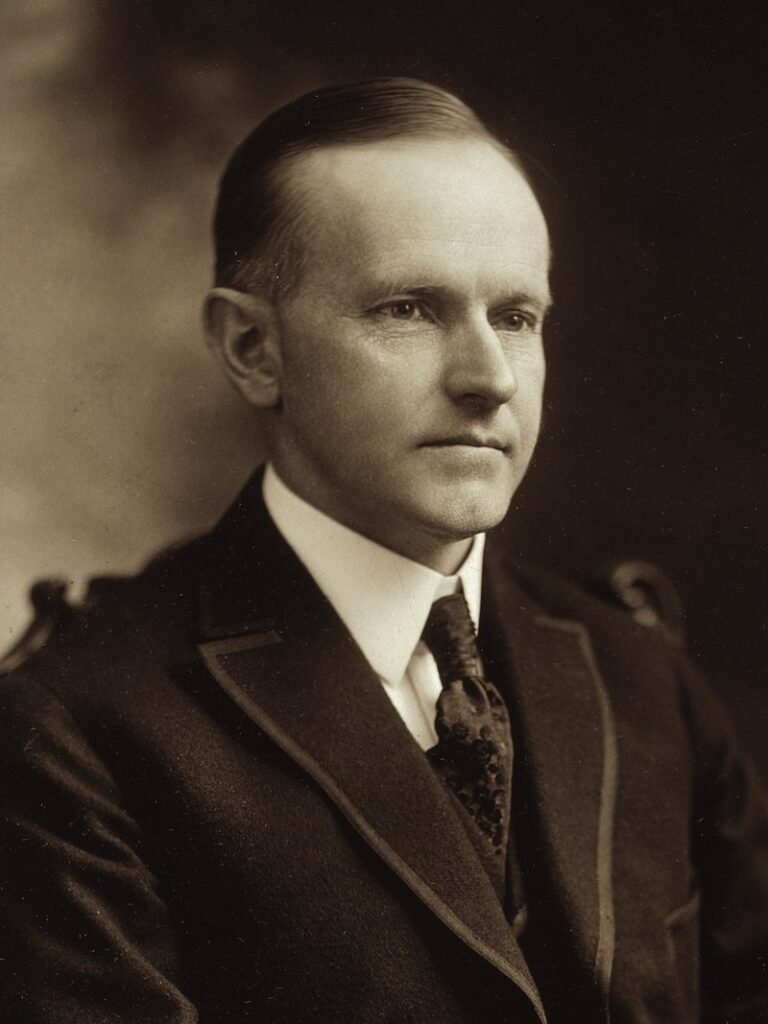
FROM WIKIPEDIA COMMONS
Calvin Coolidge (born John Calvin Coolidge Jr.; /ˈkuːlɪdʒ/; July 4, 1872 – January 5, 1933) was the 30th president of the United States from 1923 to 1929. A Republican lawyer from New England, born in Vermont, Coolidge worked his way up the ladder of Massachusetts state politics, eventually becoming governor of Massachusetts. His response to the Boston Police Strike of 1919 thrust him into the national spotlight and gave him a reputation as a man of decisive action. The next year, he was elected the 29th vice president of the United States, and he succeeded to the presidency upon the sudden death of Warren G. Harding in 1923. Elected in his own right in 1924, he gained a reputation as a small-government conservative and also as a man who said very little and had a dry sense of humor, receiving the nickname “Silent Cal”. He chose not to run again in the 1928 election, remarking that ten years as president was (at the time) “longer than any other man has had it—too long!”
Throughout his gubernatorial career, Coolidge ran on the record of fiscal conservatism and strong support for women’s suffrage. He held a vague opposition to Prohibition. During his presidency, he restored public confidence in the White House after the many scandals of his predecessor’s administration. He signed into law the Indian Citizenship Act of 1924, which granted US citizenship to the indigenous peoples of the United States, and oversaw a period of rapid and expansive economic growth in the country, known as the “Roaring Twenties“, leaving office with considerable popularity. He was known for his hands-off approach to governing and for his pro-business stances. As a Coolidge biographer wrote: “He embodied the spirit and hopes of the middle class, could interpret their longings and express their opinions. That he did represent the genius of the average is the most convincing proof of his strength.”
Scholars have ranked Coolidge in the lower half of U.S presidents. He gains almost universal praise for his stalwart support of racial equality during a period of heightened racial tension in the United States, and is heavily praised by advocates of smaller government and laissez-faire economics, while supporters of an active central government generally view him far less favorably. His critics argue that he failed to use the country’s economic boom to help struggling farmers and workers in other flailing industries. There is also still much debate between historians as to the extent Coolidge’s economic policies contributed to the onset of the Great Depression. However, it is widely accepted, including by his own Presidential Foundation, that the Federal Reserve System under his administration was partly responsible for the stock market crash of 1929 that occurred soon after he left office, which signaled the beginning of the Depression.
TODAY’S ALMANAC
Question of the Day
I need a cleaning solution for the chimney on an old oil lamp. It is very cloudy and rough, like sandpaper.Resist the temptation to use steel wool. It is an effective scourer, but it will leave scratches, especially on older glass. The easiest way is to pour a little kerosene on newspaper and wipe the chimney. (Be sure it is completely dry before lighting the lamp!) Another method is to put a few drops of rubbing alcohol on a wet rag and rub the chimney with the rag.
Advice of the Day
If you suffer backaches, empty your pockets, wear looser clothing, and don’t cross your legs.
Home Hint of the Day
Avoid rubbing a carpet stain; blot it instead. This keeps the stain from spreading.
Word of the Day
Cubit18 inches; derived from distance between elbow and tip of middle finger.
Puzzle of the Day
Why didn’t the dog want to go into the ark?He had a bark (ship) of his own.
Died
- Amerigo Vespucci (explorer) – 1512
- Francisco I. Madero (Mexican President; was assassinated) – 1913
- Ed Flanders (actor) – 1995
- Jonas Savimbi (Angola’s rebel leader) – 2002
- Chuck Jones (Warner Bros. animator, created Bugs Bunny and Daffy Duck) – 2002
- Dennis Johnson (basketball player) – 2007
Born
- George Washington (1st U.S. president) – 1732
- Rembrandt Peale (artist) – 1778
- Edna St. Vincent Millay (poet) – 1892
- Edward Moore Teddy” Kennedy” (politician) – 1932
- George Sparky” Anderson” (baseball manager) – 1934
- Steve Irwin (herpetologist and host of The Crocodile Hunter) – 1962
- Rachel Dratch (actress) – 1966
- Drew Barrymore (actress) – 1975
Events
- Popcorn was first introduced to English colonists by Native Americans– 1630
- Florida Purchase treaty signed– 1819
- The F.W. Woolworth discount store chain started in Utica, New York– 1879
- Ancient Egyptian obelisk that had been erected in Central Park was officially presented to New York City– 1881
- A fist fight broke out on the Senate floor between Senator John McLaurin and Senator Ben Tillman– 1902
- Calvin Coolidge delivered the first presidential radio broadcast speech from the White House– 1924
- A 6.4-magnitude earthquake struck near Zarand in Iran– 2005
- 10-pound 14-ounce ‘aweoweo caught, Penguin Bank, O’ahu, Hawaii– 2005
- A magnitude-6.3 earthquake struck Christchurch, New Zealand– 2011
- Babe Ruth’s 1923 World Series pocket watch sold for $717,000 at auction– 2014
- Baseball bat that belonged to Shoeless Joe Jackson sold for $958,000 at auction– 2014
Weather
- The Susquehanna River ice bridge at Havre de Grace, Maryland, began to break up after 40 days of use– 1852
- 11 inches of snow fell in Blue Lick, Missouri– 2013
COURTESY www.almanac.com
